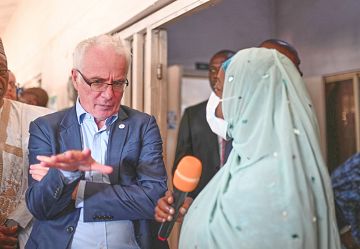State visit shines international spotlight on Kano’s malaria response
2 October 2023
Kano, one of Nigeria’s most populous states, was put under the spotlight as state officials hosted leaders from the Global Fund to Fight AIDS, Tuberculosis and Malaria (the Global Fund), U.S. President's Emergency Plan for AIDS Relief (PEPFAR), and the President’s Malaria Initiative (PMI) as part of a three-day, joint visit with the Government of Nigeria to better understand the impact of the Global Fund and PMI’s support to the area and demonstrate global solidarity.
Globally, Nigeria is the country hit the hardest by malaria, with 30 percent of admissions to hospitals resulting from this deadly, infectious disease. The Global Fund has provided more than US$1.6 billion for malaria programmes worldwide to date.
Dr Kolawole Maxwell, the West & Central Africa Programmes Director from Malaria Consortium, commented at the event: “Kano has experienced good progress in reducing the burden of malaria in the state through the state government contributions, Global Fund and other partners. Malaria prevalence in under-fives has decreased from 32 percent in 2018 to 26 percent in 2021 and an estimated 5.6 million cases have been averted between 2009 and 2021. Sustained investment is crucial in enabling the state government, with support from partners including Malaria Consortium and others, to continue delivering highly effective malaria interventions. These interventions can also facilitate increased access to essential services, strengthen case management and monitoring and evaluation and build capacity within health systems to further reduce this burden as we strive to eliminate malaria.”
As part of the three-day visit, the Officer-in-Charge of the Madatai Primary Healthcare Centre, Mrs Hasiya Adamu Nasidi, explained how this hospital worked with the community to prevent malaria through delivery of seasonal malaria chemoprevention (SMC). SMC is a highly effective intervention which helps to prevent malaria in children under five via door-to-door delivery of antimalarials by trained community drug distributors during the rainy season when malaria transmission peaks. This year, Malaria Consortium’s SMC programme will reach around 25 million children across seven countries.
Sha’arani, a local resident living near the health facility in Madatai received sulfadoxine-pyrimethamine (SP) together with amodiaquine (AQ) at home for all three of his children during this year’s campaign. At the visit, he said, “I am so happy the intervention has protected my children from severe malaria. None of my children is having that severe malaria, they are all healthy”. He added, “I said I must be here to receive the honourable minister for health, the ambassador…I will place it as a historic moment to me”.
Delegates also visited Murtala Mohammed Specialist Hospital to observe health workers treating cases of severe malaria amongst children. A doctor overseeing the emergency ward was happy that in just a few days the government would commence mass recruitment to hire new doctors at his facility, many of whom have left to work abroad. He said, “it’s a win-win on both sides for everybody, for the patients and for the staff. Fewer cases of severe malaria will reduce the physical, mental and psychological drain on doctors and more staff will also help with this issue”.
Diagnosis and treatment (case management) of malaria are also key strategies for malaria control but the quality of malaria laboratory diagnosis in Nigeria required for appropriate case management, effective disease surveillance and public health response at the national and state levels is below the World Health Organization standards. This is mainly due to inadequate competency of laboratory technicians, lack of equipment, limited participation of public and private health facilities in external quality assurance (EQA) scheme, and sub-optimal case management of severe malaria.
The Global Fund malaria project led by Catholic Relief Services and National Malaria Elimination Programme, through Malaria Consortium as a sub-recipient of the Global Fund Malaria grant is supporting this hospital to embed quality assurance and supportive supervision systems, improve the quality of malaria diagnosis and treatment and increase access to use of free injectable artesunate. The Global Fund also supports Muritala Muhammed Specialist Hospital with other free malaria health products like artemisinin-based combination therapy (ACT), malaria rapid diagnostic tests (mRDTs), and insecticide treated nets (ITNs).
Photo credit: Dawali David / Malaria Consortium
Related content
23 October 2023
ASTMH Annual Meeting pinpoints research gaps to advance global health
Latest news
- Malaria Consortium honoured by Ugandan government for contribution to combat malaria23rd April 2024
- International summit calls for AMR accountability in public health interventions21st March 2024
- Global SMC community celebrates new milestone at SMC Alliance Annual Meeting in Nigeria6th March 2024
- Scaling up key interventions could halve pneumonia-related childhood mortality13th February 2024
- Malaria Consortium and eGov Foundation join Mozambique’s national malaria programme to digitalise seasonal malaria chemoprevention campaigns8th February 2024
- World’s first malaria vaccine rollout launched in Cameroon22nd January 2024